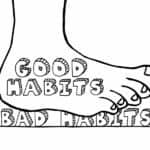As humans, we have a full range of emotions and many thoughts that accompany those emotions. To be healthy and happy, we need to be aware of our feelings. When we know our emotions are valid, we can accept ourselves as we are, change and grow. We can create a powerful life and have enriched relationships.
What Is Mindfulness?
Some of us were taught to ignore our emotions and some of us have lives that are full and noticing our feelings is not a priority. If we don’t take the time to notice our thoughts and feelings we may end up being controlled by our emotions.
We may have vague feelings without a name and without a cause. We may lose interest in our hobbies and connections. The destructive effect can harm our relationships eroding the connections we so badly want with others to our performance at work, as well as our physical and mental health, everything can be affected. There are also many people who are led to believe strong emotions are to be avoided at all costs, and attempt to cope with their emotions by using alcohol, drugs or dissociate from the situation.
When we practice mindfulness, we become aware and conscious. When we know exactly what we are thinking and feeling, and determine the cause of the emotion, we can focus on resolving the cause.
Mindfulness And Our Feelings
When we have a feeling, we are experiencing it in the present moment. It may be a mild discomfort that is only slightly bothersome, or it may be completely overwhelming. Even a minor discomfort does not go away if we try to ignore it, and it may even worsen. At its worst, we can become incapacitated by something we do not understand.
When we practice mindfulness, we accept what we are feeling in the moment. When we are able to do this, we start to see solutions do exist. We are no longer controlled by feelings of hopelessness and helplessness.
Anxiety is an issue I had trouble with a few years ago. For a long period of time, it affected my ability to function. A vague sense of anxiety eventually turned into full-blown panic attacks. Whenever I needed to go out on an errand, my heart pounded and raced and I could not breathe. I found myself avoiding outside errands, and putting them off as much as possible.
I began to utilize mindfulness techniques and I found when I practiced feeling, thinking, and breathing in the moment, I learned something very important: all of those anxiety symptoms were based on fear that was not relevant to the present moment at all.
Mindfulness is helpful in dealing with anger. When anger is not understood by looking at our thoughts and feelings, it is often not expressed appropriately. If it is held in, it can cause physical discomforts. If it is let out inappropriately, it can be harmful to others we care about.
When we allow ourselves to feel our anger, and know it is a valid emotion, we can find a different, acceptable way to express it. We can calmly discuss the reason for our anger with another person, or find another suitable outlet such as yoga or exercise.

Joy and happiness are emotions, too, but they also can sometimes get the better of us. Perhaps we were raised to not be too expressive, and still believe these feelings are irrelevant or immature. Perhaps joy can be an excuse to make poor choices, such as drinking too much to celebrate a happy occasion. There are healthier ways to express joy, and we can have personal benefits from practicing mindfulness.
When we allow ourselves to fully experience our joy, it can be a transformation. We can feel good, and share those good feelings with other people in our lives. It can have a positive influence on everyone we meet.
Experiencing happiness and joy through mindfulness can improve our health. When we are filled with joy, it can actually decrease the risk of many health problems. We are less likely to be bothered by insomnia, gastrointestinal issues, and headaches.
Mindfulness And Pain
Whether you have pain from a medical condition or an experience in your life, mindfulness can help you with the pain you feel.
Mediation is a great way to do this. Let go of the past and the future, and experience the present. Allow everything but your body and mind to fall away. Make a conscious decision to accept whatever you experience.
Next, focus your attention on each body part, one by one. Feel each part with your mind, and notice any sensation that occurs. Do not judge any part as painful. After you have scanned each part, become aware of your whole body and feel your body from within. Experience this whole body awareness for a few moments.
This practice does not focus on eliminating your pain; instead, you can observe your pain and understand it. It can help relieve pain, and it can help you cope with it.

How Mindfulness Works To Better Your Life
There are a number of reasons individuals do not take their emotions seriously.
One common reason is childhood training. There are parents who teach their children it is wrong, bad, or foolish to have feelings, and punish their children for expressing themselves. The children often learn at a young age that it is not safe to express emotions, and must act as if their feelings do not exist.Some children learn only certain emotions are acceptable. They may have learned anger is valid, but pain is not. As a result, many normal emotions are shut down, and other emotions are out of control.
Adults may have been taught emotions are childish. They avoid expressing themselves when they fear they will be ridiculed. All of these beliefs are harmful. When individuals are taught to hold their emotions in, it can reach the point of not even knowing what they are feeling.
Emotions that are not recognized and not understood can cause a wide range of problems, from affecting relationships, to developing medical conditions. If you have lived by any of these beliefs, mindfulness can make a difference.
When you want to experience what it is like to be fully human, it includes the entire range of emotions that every human being naturally possesses.
Think of how wonderful it will be when you no longer hold back feelings of pain, anger, or joy. You will understand yourself, and it will be easier to communicate with others. You will feel good about yourself when you know all of your emotions are real and valid. You will have better physical and mental health, too. Along with fewer health risks, you can have a lower risk of mental illness. Your daily life will not be affected by overwhelming stress and worry. Your life can be more fulfilling and balanced.
Perhaps you can function when you ignore your feelings, but you do not function nearly as well, when something is bothering you, but you do not know what it is or where it is coming from. Perhaps you are so busy with work or other responsibilities that your everyday life has become an excuse.
You do not have unlimited time to explore your feelings, so you act as if they do not exist. Now is the time to set these excuses aside. You do not need to devote a huge amount of time to meditation. As a beginner, you can start with a few minutes per day. After you have become accustomed to mindfulness, you will be able to practice it anywhere, at any time. Experiencing your emotions in the present moment will be a regular part of your life.
Mindfulness can help you get in touch with yourself. For many individuals who practice mindfulness, it is quite revealing. This new understanding can help you appreciate yourself, and truly enjoy your life.
If you are often upset or worried, have physical symptoms that do not have a medical cause, or do not feel as connected as you would like to be to people in your life, do not assume you have a mental health issue or suffer in silence. When you start connecting to yourself with mindfulness, your entire life can improve. You can have peace of mind, true fulfillment, and overall better health.
Final Thoughts
Sitting and accepting your thoughts and emotions in the moment is challenging and requires practice. Each day you practice your skill will grow.







